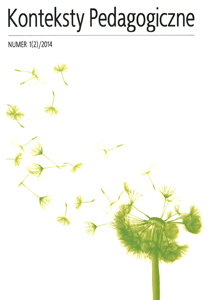Abstract
A folk fable was one of the folk genres that had the unusually significant educative importance. Through the simplicity and generalization of the construction of a story plot, the lack of descriptive elements, aiming at universal depictions, the binary system of characters and the optimistic ending showing the victory of good over evil, the folk fable presented the world of values and shaped their hierarchy. The human characters, deprived of the psychological depth, represented certain morally unambiguous types and were an inexhaustible treasure trove of patterns of behaviour. Unfortunately, the field researches have shown that during the 20th century the folk fables started to vanish from the oral transmission. This makes us ask ourselves a question whether the contemporary adaptations perform the same significant functions as folk fables did, since the realization of them is still necessary for humankind. The author of the following study analyzes three screen adaptations, discussing what picture of the world and a human is given by them and if, therefore, they can perform the same functions as folk fables or, perhaps, their impact is different.
References
Bajka zwierzęca w tradycji ludowej i literackiej, red. A. Mianecki, V. Wróblewska, Toruń 2011.
Bartmiński J., Literatura chłopska wobec językowych tradycji folkloru, [w:] Literatura ludowa i literatura chłopska. Materiały z ogólnopolskiej naukowej sesji folklorystycznej 16–18.02.1973, red. A. Aleksandrowicz, Cz. Hernas, J. Bartmiński, Lublin 1977.
Bettelheim B., Cudowne i pożyteczne. O znaczeniach i wartościach baśni, t. 2, przeł. D. Danek, Warszawa 1985. Ilnicka M., Czytanie dziecinne, „Bluszcz” 1870, nr 50.
Jolles A., Proste formy, przeł. R. Handke, „Przegląd Humanistyczny” 1965, nr 5.
Kapełuś H., Przedsłowie, [w:] J. Krzyżanowski, W świecie bajki ludowej, Warszawa 1980.
Kasjan J.M., Maxa Lüthiego koncepcja bajki, [w:] J.M. Kasjan, Usta i pióro. Studia o literaturze ustnej i pisanej, Toruń 1994.
Krzyżanowski J., Polska bajka ludowa w układzie systematycznym, t. 1–2, Wrocław 1962–1963.
Krzyżanowski J., W świecie bajki ludowej, Warszawa 1980.
Lüthi M., Cechy narracji w bajce ludowej, przeł. J.M. Kasjan, „Literatura Ludowa” 1982, nr 2.
Lüthi M., Zabójca smoka. O stylu bajki, przeł. J.M. Kasjan, „Literatura Ludowa” 1982, nr 3.
Ługowska J., Bajka w literaturze dziecięcej, Warszawa 1988.
Ługowska J., Ludowa bajka magiczna jako tworzywo literatury, Wrocław 1981.
Ługowska J., W świecie ludowych opowiadań, Wrocław 1993.
NiebrzegowskaBartmińska S., Porządek tekstu bajki jako odwzorowanie porządku świata, [w:] Genologia literatury ludowej. Studia folklorystyczne, red. A. Mianecki, V. Wróblewska, Toruń 2002.
Olkusz W., Baśń – cudowność – fantastyka. Refleksje Marii Ilnickiej na tle pozytywistycznej pedagogiki oraz krytyki literatury dla dzieci i młodzieży, „Literatura Ludowa” 2000, nr 4/5.
Propp W., Nie tylko bajka, przeł. D. Ulicka, Warszawa 2000.
Proza folklorystyczna u progu XXI wieku. Bajka ludowa, legenda, anegdota. Materiały, oprac. A. PrzybyłaDumin, Chorzów–Katowice 2013.
Proza folklorystyczna u progu XXI wieku. Podanie, opowieść wspomnieniowa, legenda współczesna. Materiały, oprac. A. Przybyła–Dumin, Chorzów–Katowice 2013.
PrzybyłaDumin A., Proza folklorystyczna u progu XXI wieku na podstawie badań terenowych. Monografia, Chorzów–Katowice 2013.
Ranke K., Rozważania o istocie i funkcji bajki, przeł. J.M. Kasjan, „Literatura Ludowa” 1997, nr 2.
Robotycki C., Moralny i strukturalny aspekt „dobra” i „zła” w bajce magicznej, [w:] Pożegnanie paradygmatu? Etnologia wobec współczesności, red. W.J. Burszta, J. Damrosz, Warszawa 1994.
Rzyman A., Teoria baśni i magii wg Robin’a George’a Collingwood’a, „Literatura Ludowa” 2011, nr 2.
Simonides D., Śląska bajka ludowa dawniej a dziś, b.m, ok. 1965.
Simonides D., Współczesna śląska proza ludowa, Opole 1969.
Wróblewska V., Ludowa bajka nowelistyczna (źródła – wątki – konwencje), Toruń 2007.
In accordance with the recommendation of the Ministry of Science and Higher Education, which aims to counteract the practice of “ghostwriting” and “guest authorship,” all authors submitting their text for publication should attach an author’s statement which declares the contribution of each of the authors to the article. The printed and signed statement should be delivered by mail or other means to editor-in-chief Joanna Skibska or sent in the form of a scan to the following e-mail address: redakcja@kontekstypedagogczne.pl. The authors will not receive remuneration for publishing their papers. The editors reserve the right to make minor editorial changes to the articles which will not affect the substance of the article. We encourage all authors to prepare their articles in accordance with the guidelines for manuscript preparation. Download pdf file.
Authors transfer all copyrights and grant the journal the right of first publication with the work simultaneously licensed under a Creative Commons Attribution License that allows others to share the work with acknowledgement of the work's authorship and initial publication in this journal. All authors agree to the publishing of their email addresses, affiliations and short bio statements with their articles during the submission process.

